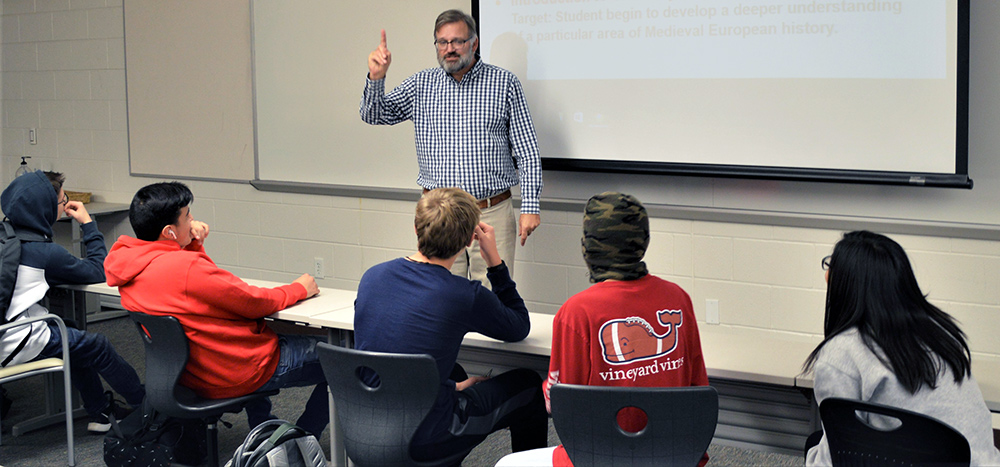Sparta High School history teacher Doug Hart has taught in multiple states and countries. Now he has worked with students and the district to develop a way he said he hopes “reinvigorates the school community by providing a common focus.”
Hart hopes the COVID-19 International Student Film Festival, hosted by Sparta High School, will be not only a fun, creative exercise but also one that helps students connect with the world and better understand their challenges in a broader context.
And the list of judges he’s amassed so far read like a who’s who of the film and media world, including professionals from the Washington Post, an Emmy award-winning documentary filmmaker and a New York Times director of cinematography, to name just a few.
“The idea sold itself,” Hart said. “Every individual I talked to is excited to see what the kids come up with. Other industries like filmmaking and broadcasting, there’s a larger interest in this historically significant event.”
Hart, who teaches both world and U.S. history, said he thinks living in the time of a global pandemic is “a big point in history, which will hopefully happen only once in a lifetime, but right now we are uniquely qualified to contribute to it.”
What: COVID-19 International Student Film Festival, spearheaded by Sparta Public Schools
Where: The festival will take place on YouTube, with the site announced on May 16
Who is eligible: Middle and high school students, schools and performing and film artists throughout the world.
Deadline: The local phase of the festival, which includes only Sparta entries, ends May 1. Worldwide submissions are due on May 15. International winners will be announced on May 22. Winners will be named in each school district first, then internationally, and in fiction and nonfiction categories.
Judging: Sparta films will be judged by district middle and high school students. If there’s a tie, a staff team will cast the deciding vote. International judges are being assembled, and a complete list will be added to the festival website.
Prizes: To be determined
Complete details can be found here.
How students and families are spending their time now will be a valuable piece of history, he said. “This is an opportunity to see the larger school community and the impacts of the pandemic.
“History teachers 100 years from now will be talking about it, and now is the time for kids — worldwide — to come out and give future generations a glimpse of their routines and how they felt (during the pandemic).”
What to Share
In the fiction category, students may submit any dramatization, including poetry and monologues. These may include genres and types such as musical, rap, animation, science fiction, Western, fantasy, silent films, gangster and animation.
“History teachers 100 years from now will be talking about it, and now is the time for kids — worldwide — to come out and give future generations a glimpse of their routines and how they felt.”
— Sparta High School teacher Doug Hart
Non-fiction may include monologues, dialogues, interviews, docudramas, musicals, raps, animation, PowerPoints and Prezis.
Judging will take into account overall presentation, performance and content.

Worldwide Issue
The festival allows films of up to two minutes, and can include family members of one household or collaboration with those in other households.
Hart has shared his idea with fellow teachers, administrators and locals in many countries, including where he has visited or taught. Hart said he has heard interest from schools in North Carolina, Florida, some states in Western U.S., plus Italy, Spain, the Netherlands, Egypt and Japan.
“I really don’t know how many will participate, but I guess that is part of the fun,” he said.
He recognizes the task teachers and schools face to provide remote education “without much time for planning” as a possible obstacle.
“Teachers around the world are challenged by new online approaches to learning and in a real time crunch,” he said. “I know of some that said they want to make this (film festival) a significant part of learning, but they have work to do to understand how to fit it into their curriculums or integrate into other learning experiences. So we’ll just have to see how many participate.”










